Resin-bound gravel stands out as an environmentally sound choice for British homes and businesses. The surface allows rainwater to drain naturally, helping prevent flooding whilst replenishing groundwater supplies – particularly useful given the UK’s wet climate. Crafted largely from recycled materials, including waste glass and stone, it reduces the strain on our landfills. Installation requires less energy than traditional paving, and once laid, it lasts over two decades with minimal upkeep. The finished surface creates safe, attractive spaces ideal for driveways, paths and public areas. Its non-slip qualities suit Britain’s weather perfectly, whilst its smooth finish proves practical for pushchairs and wheelchairs.
Key Takeaways
Resin-bound gravel offers brilliant environmental perks for UK homeowners and businesses:
The surface naturally handles our notorious British rain, soaking up water like a sponge rather than creating puddles or flooding – much like a well-designed garden border.
It’s properly sustainable, using recycled materials that would otherwise clog up our landfills. The eco-friendly resins work brilliantly with reclaimed aggregate, making it a top choice for green building.
Installing it’s a doddle – minimal fuss, local materials where possible, and far less energy use than traditional paving. Think of it as the building equivalent of switching to LED bulbs.
Once laid, it’s as tough as old boots. You won’t need harsh chemicals or constant upkeep, and it lets nature do its thing with proper drainage. Perfect for our unpredictable weather.
Best bit? If you ever need repairs, you can fix small sections without ripping up the whole lot. It’s ideal for everything from driveways to town squares, making outdoor spaces more useful while keeping things green.
Permeability and Natural Water Management

Resin-bound gravel offers more than just kerb appeal – it’s brilliant for managing rainwater naturally. The surface lets water drain straight through, topping up groundwater levels that keep our local plants and wildlife thriving.
Unlike concrete or tarmac, you won’t get annoying puddles forming, and it helps prevent flooding during heavy downpours. Think of it as a natural filter: when rain falls, the gravel system catches dirt and pollutants before the water makes its way underground. It’s particularly useful in British weather, where we get plenty of rain throughout the year. Additionally, these permeable surfaces can handle up to 95% of rainfall efficiently, making them an excellent choice for effective drainage.
For homeowners looking to do their bit for the environment whilst maintaining a smart driveway or patio, resin-bound gravel ticks all the boxes. This surface works hand-in-hand with sustainable drainage systems, which are becoming increasingly important in UK towns and cities. Additionally, it is designed to be permeable, allowing for effective water management and reducing surface water runoff.
It’s a practical choice that looks good and helps protect our environment – quite simply, a sound investment for any British property.
Incorporation of Recycled and Sustainable Materials
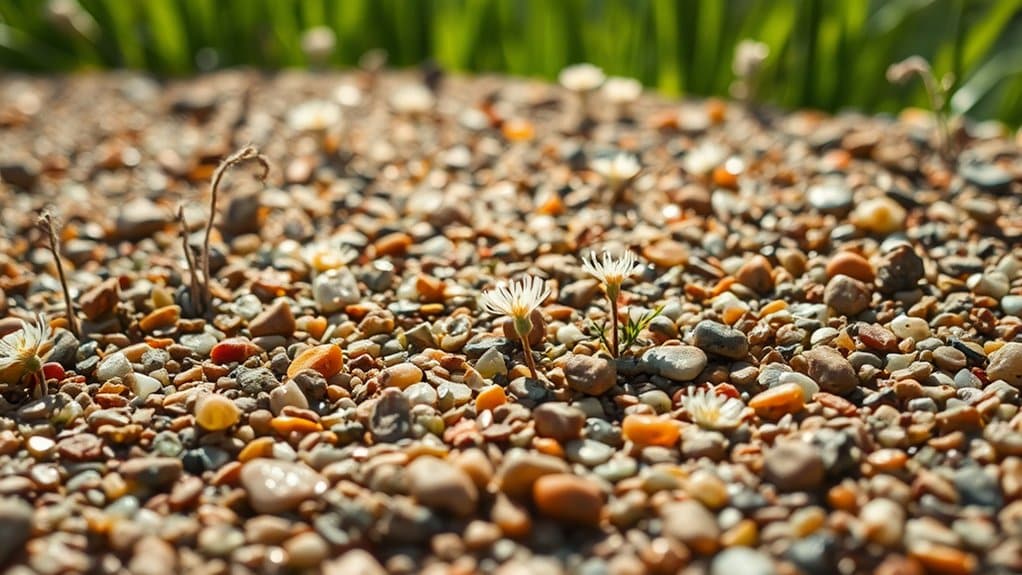
Resin-bound gravel offers both visual appeal and environmental benefits. The system uses recycled materials, including crushed glass and natural stone aggregates, helping reduce landfill waste across the UK. Modern eco-friendly resins complete this sustainable surfacing option, making it a practical choice for environmentally conscious homeowners and businesses. Additionally, this system provides permeable paving that allows for easy drainage and supports natural greenery in urban environments. Moreover, incorporating recycled materials not only enhances aesthetic value but also contributes to reducing stormwater runoff and improving water quality in local ecosystems.
Recycled Glass Usage
Recycled glass in resin-bound gravel offers both visual appeal and environmental benefits. The glass aggregates create striking colour variations whilst diverting waste from UK landfills. These materials perform brilliantly under heavy loads and resist clogging, making them perfect for driveways and garden paths. Additionally, resin bound gravel is compliant with SUDS regulations, which helps reduce flood risks in urban areas. The mixture earns LEED sustainability credits, though supply can be tricky as more builders opt for eco-friendly materials. Think of it like using crushed wine bottles and window panes to create a sparkling, durable surface – it’s practical recycling that looks fantastic. Also, the eco-friendly features of resin-bound gravel contribute to a sustainable solution in modern landscaping. Choosing glass-blend surfaces for your project helps support Britain’s circular economy whilst delivering a unique finish that stands up to our weather. It’s a straightforward way to make your property more environmentally friendly without sacrificing quality or style.
Sustainable Aggregate Sources
Sustainable aggregate choices go far beyond recycled glass.
Local natural materials like gravel, quartz and marble are ideal for resin-bound surfaces, cutting transport costs and supporting regional businesses. These aggregates look brilliant, matching perfectly with the surrounding landscape whilst offering exceptional longevity.
The permeable nature of resin-bound gravel helps manage rainwater effectively, reducing local flood risks.
Choosing sustainable aggregates makes solid environmental sense and strengthens your local economy – a practical approach that delivers real benefits.
Renewable Natural Resins
Renewable natural resins are transforming sustainable construction in the UK. These plant-based alternatives, made from crops like soybeans and sugarcane, offer clear advantages over traditional petroleum-based resins. They cut fossil fuel usage and carbon emissions whilst maintaining strong performance standards.
By combining these resins with recycled materials, such as plastic bottles and packaging waste, builders can create even more environmentally sound solutions. The resins break down more readily than conventional options and contain fewer harmful chemicals, meeting strict UK and EU environmental guidelines.
For British construction firms and DIY enthusiasts looking to reduce their environmental impact, renewable natural resins represent a practical, forward-thinking choice.
They’re particularly useful in projects like timber treatments, flooring adhesives and protective coatings, where durability and eco-credentials matter equally.
Low Carbon Footprint During Installation

Resin-bound gravel offers a remarkably low carbon impact during fitting.
The straightforward installation uses fewer resources than traditional paving methods and produces minimal waste.
Quick to lay and ready for use within 24 hours, this surface causes less disruption to your garden or driveway whilst being kinder to the environment.
Energy Efficiency During Installation
Energy Efficiency During Installation
Resin-bound gravel installation offers significant energy savings compared to traditional surfacing methods. The process is notably quick, reducing both labour and resource consumption. On-site cold-mixing requires minimal energy, whilst cutting carbon emissions. Modern equipment like the EcoBatcher mobile mixing unit further reduces transport needs and environmental impact.
| Installation Feature | Energy Efficiency Impact |
|---|---|
| Quick Application Process | Reduces labour and resources |
| Cold-Mixing Technique | Minimal energy consumption |
| Advanced Equipment | Lowers environmental impact |
| Reduced Transport Needs | Cuts emissions |
| Efficient Materials | Less energy in production |
A practical choice for environmentally conscious installations.
Minimal Waste Generation
Choosing resin-bound gravel helps cut waste significantly whilst beautifying your space. The system uses local aggregates, reducing transport miles and supporting British suppliers.
Modern mixing equipment, such as the EcoBatcher, ensures precise measurements that prevent material waste and eliminate single-use plastics.
The efficient installation process means fewer lorry deliveries and less packaging waste. Because resin-bound surfaces last for years with minimal maintenance, you won’t need frequent replacements – much like a well-laid garden patio that stands the test of time.
This practical approach to surfacing proves that environmentally conscious choices don’t compromise on quality. You’ll get a durable, attractive surface whilst doing your bit for sustainability.
Reduced Landscape Disruption
Resin-bound gravel stands out for its minimal impact during installation. The process needs less heavy machinery than traditional surfacing, cutting down on both energy use and ground disturbance.
Installation is swift – typically completed within days – which means less disruption to your garden or driveway.
The method is notably quiet compared to conventional paving work, and causes minimal soil displacement. Using materials from local quarries reduces transport miles and supports British suppliers.
The finished surface fits naturally with existing garden features, whether you’re updating a path, driveway or patio area.
The end result is a practical surface that’s both environmentally conscious and aesthetically pleasing, achieved with far less upheaval than most alternative options.
Durability and Longevity of Resin-Bound Surfaces
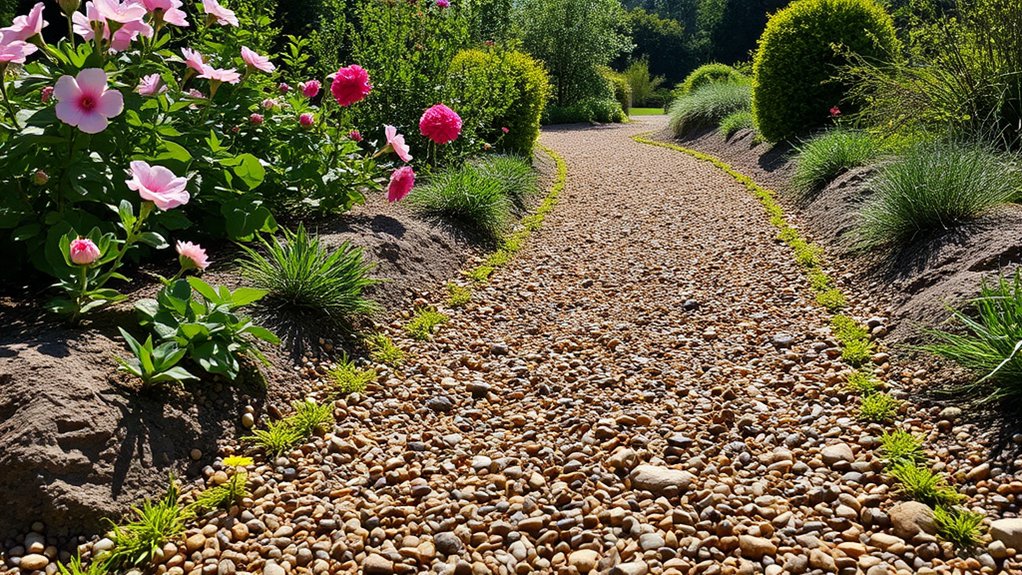
Resin-bound gravel stands out as one of the most durable outdoor surface options in the UK. It typically lasts 15-25 years, stretching to 30 years with proper care.
Unlike traditional tarmac or loose gravel driveways, these surfaces handle heavy cars and frequent foot traffic without cracking. Think of it as similar to a well-laid patio that maintains its look and function for decades.
Regular maintenance keeps the surface in top condition – a reseal every 3-5 years does the job.
Getting the installation right from the start, using quality materials and ensuring proper drainage, makes all the difference.
For a typical British driveway or garden path, resin-bound gravel proves a sound investment, outlasting most traditional surfacing options whilst keeping its smart appearance.
Ecosystem and Aesthetic Benefits
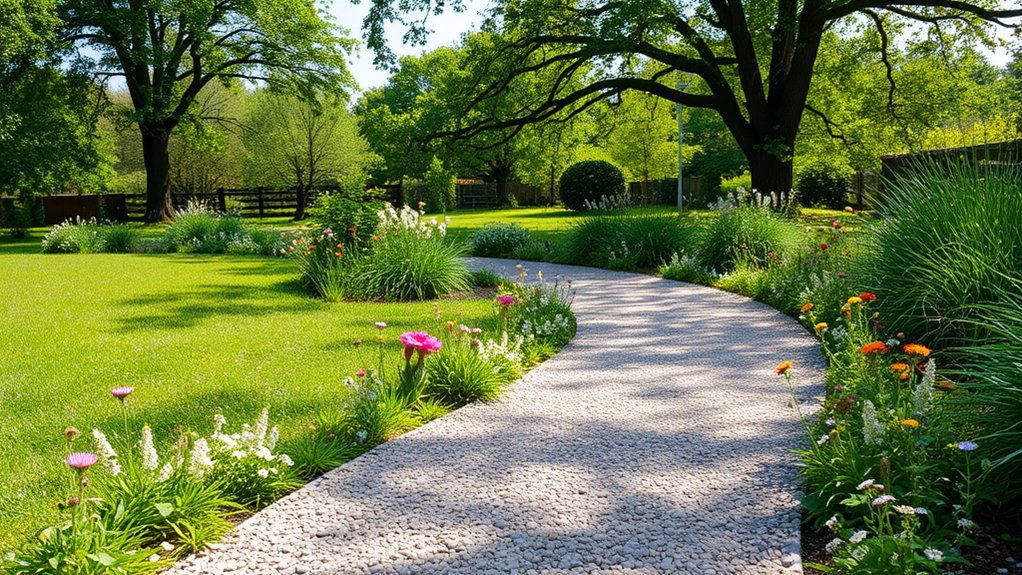
Resin-bound gravel offers significant benefits for both local ecosystems and garden aesthetics.
The permeable surface lets rainwater drain naturally into the ground, supporting proper water cycles and reducing flood risks common in British gardens. Its natural look works brilliantly with any landscape design, from traditional cottage gardens to modern minimal spaces.
Choose from various colours and finishes to match your home’s style – think warm honey tones for period properties or sleek greys for contemporary designs.
The surface naturally prevents weeds without chemical treatments, whilst standing up to British weather year-round.
With minimal upkeep needed, you get an attractive driveway or path that’s kind to the environment.
Effective Stormwater Management
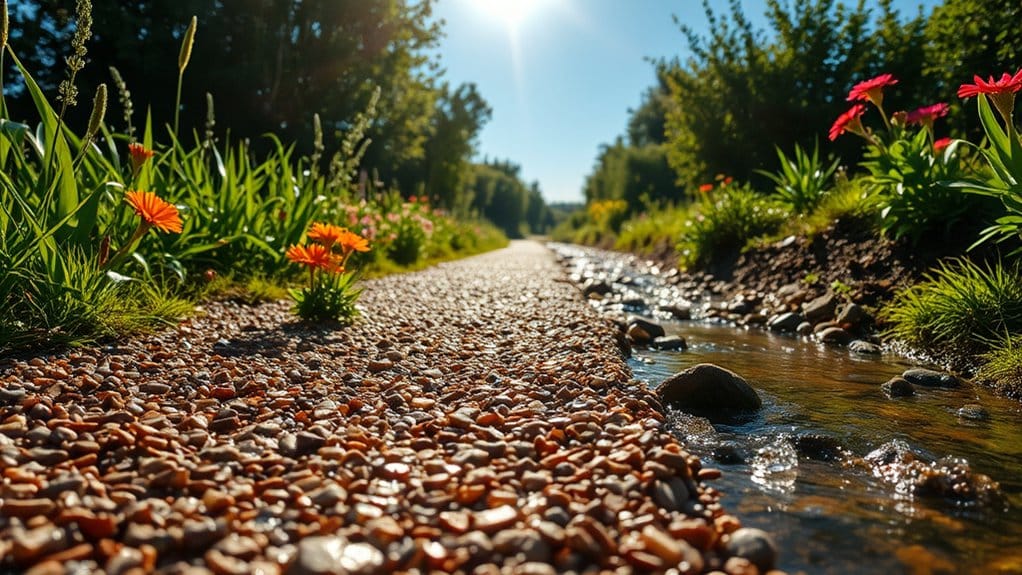
Proper stormwater management is vital during rainfall, and resin-bound gravel serves as a practical solution.
Its porous surface lets rainwater seep through naturally, much like a garden soil would, reducing flooding risks around your home and driveway.
The gravel layers also act as a natural filter, catching harmful substances before they wash into local streams and rivers.
Think of it as a built-in drainage system that protects both your property and the wider environment.
Natural Rainwater Drainage
Resin-bound gravel offers a practical solution to urban rainwater drainage, working much like natural ground would. The porous surface lets water filter through naturally, cutting down on street flooding and water build-up.
Key benefits:
- Handles massive amounts of rain – up to 850 litres per square metre every minute
- Stops puddles forming, making paths and driveways safer
- Meets all UK sustainable drainage (SUDS) requirements
- Filters out pollutants before water reaches the ground
- Helps local wildlife by maintaining natural water cycles
Perfect for British weather, this surface proves particularly useful during heavy downpours and extended wet periods.
Think of it as a giant sieve – water simply passes through rather than pooling on top or running off into drains.
Flood Risk Reduction
Resin-bound gravel plays a vital role in managing flood risk, particularly in Britain’s urban centres where concrete and tarmac prevent natural drainage.
This permeable surface allows rainwater to soak through rather than pool or run off, much like a natural lawn would. Think of it as a giant sponge – when rain falls, the water filters through the gravel instead of flooding pavements and roads.
Installing resin-bound surfaces helps take pressure off our often-strained drainage systems, reducing the likelihood of street flooding during heavy downpours.
It’s especially effective in car parks, driveways and pedestrian areas where traditional surfaces often lead to puddles and flooding.
The benefits are clear: less surface water during storms, better protection for local buildings and infrastructure, and reduced strain on our sewers.
As British weather becomes more extreme due to climate change, these practical solutions are becoming increasingly important for our towns and cities.
Pollution Filtration Benefits
Pollution Filtration Benefits
When rainwater passes through resin-bound gravel, it undergoes natural purification that significantly reduces pollutants before they enter groundwater. This material effectively tackles common urban pollutants like oil, petrol and road salt, whilst supporting sustainable drainage:
- Filters out harmful chemicals and pollutants
- Replenishes underground water sources cleanly
- Cuts down surface water flooding
- Meets SUDS requirements for UK developments
- Reduces pressure on local drainage networks
Reduced Surface Water Runoff

Choosing resin-bound gravel for your surfaces helps control water runoff whilst improving the look of your property. The permeable surface lets rainwater soak through naturally, which improves water quality and supports eco-friendly urban development. This effective stormwater management reduces flood risks in built-up areas and helps maintain groundwater levels.
| Benefit | Description | Impact |
|---|---|---|
| Permeable Structure | Lets water filter through naturally | Cuts surface water runoff |
| Stormwater Management | Controls water flow to prevent flooding | Makes towns more resilient |
| Groundwater Replenishment | Works with nature’s water cycle | Keeps water levels balanced |
| Pollution Filtration | Catches pollutants before reaching waterways | Protects local rivers |
| Drainage System Relief | Takes pressure off town drainage networks | Reduces council costs |
The system works much like a natural surface, similar to grass or soil, rather than forcing water into overstretched drains. This practical approach proves particularly valuable during Britain’s heavy rainfall periods, helping to prevent the surface flooding often seen with traditional paving.
Preservation of Local Flora and Fauna
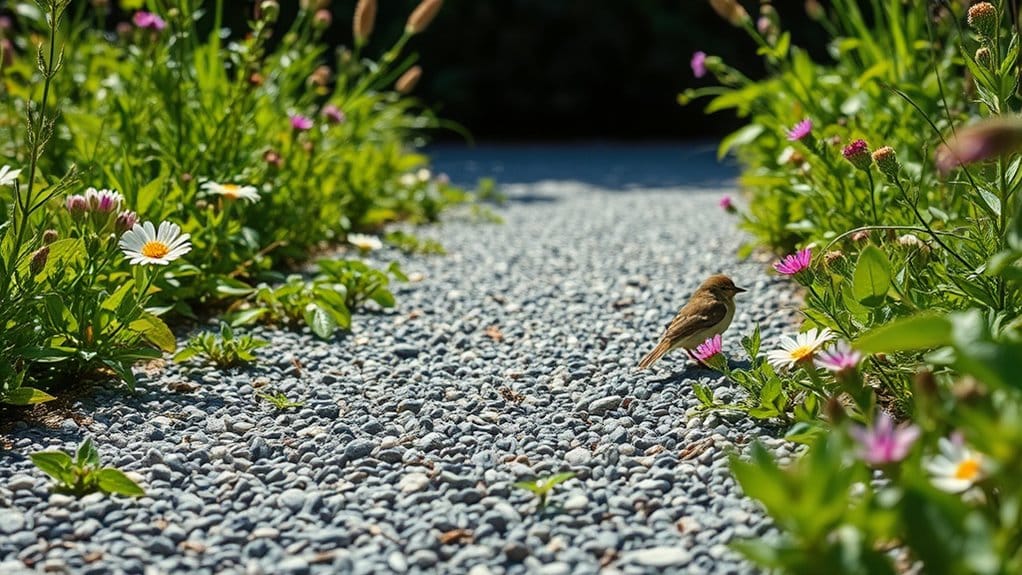
Resin-bound gravel helps protect your local wildlife and plant life whilst enhancing your property’s appearance.
This environmentally sound choice benefits the natural surroundings in several key ways:
- Protects tree roots from compaction damage
- Stops soil washing away during heavy rainfall
- Allows rainwater to filter naturally into the ground
- Produces fewer harmful emissions than traditional surfaces
- Blends naturally with existing garden landscapes
By choosing resin-bound gravel for your outdoor space, you’re supporting local wildlife whilst creating an attractive, practical surface.
It’s a straightforward way to make your property more environmentally friendly.
Recycling Capabilities and End-of-Life Benefits

Resin-bound gravel offers exceptional recycling benefits compared to traditional paving methods.
The system incorporates recycled materials, including crushed glass and recycled plastic, which significantly cuts down on new material usage. Its modular nature means you can replace damaged areas without ripping up the entire surface – a practical way to reduce waste.
The material is particularly sustainable, with up to 80% being recyclable at the end of its life. When it does break down, it won’t harm the soil, and the crushed remnants can be repurposed for other building projects.
These eco-friendly features make resin-bound gravel a smart choice for environmentally conscious UK property owners.
Contribution to a Circular Economy
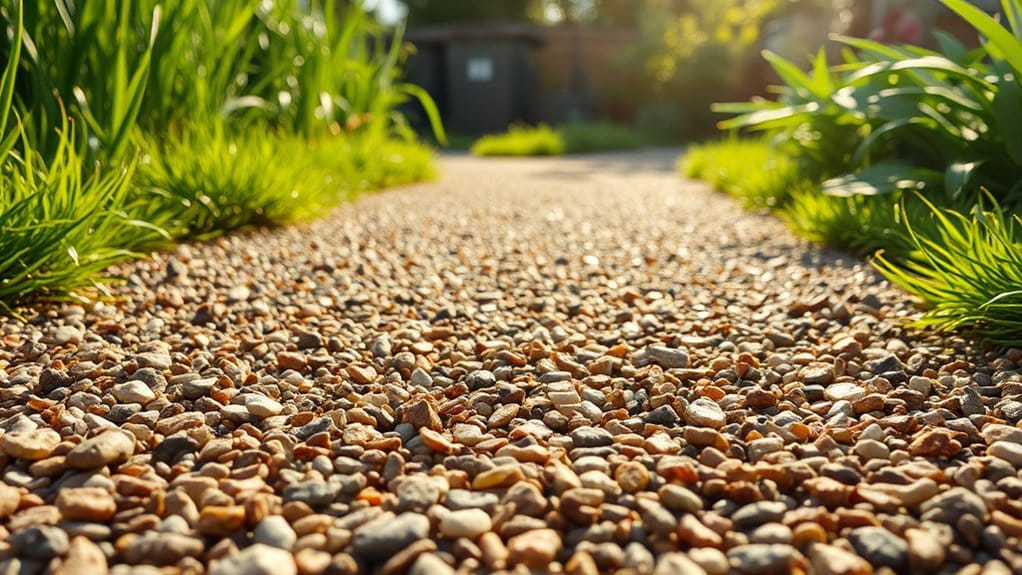
Contribution to a Circular Economy
Resin-bound gravel is a practical choice for sustainable paving that supports the UK’s circular economy. It delivers both environmental benefits and lasting performance whilst promoting greener construction practices.
Reduced Waste
Uses recycled materials from local construction projects, keeping waste out of British landfills.
Resource Conservation
Repurposes existing materials like crushed glass and stone, reducing the need for new quarrying.
Sustainable Production
UK manufacturers employ energy-efficient processes and locally-sourced materials to minimise their carbon footprint.
Closed-Loop Systems
Materials can be recovered and reused at the end of their life cycle, creating a continuous recycling loop.
Local Sourcing
Materials come from nearby suppliers, cutting transport distances and supporting regional businesses across Britain.
Enhancing Urban Green Spaces and Community Appeal
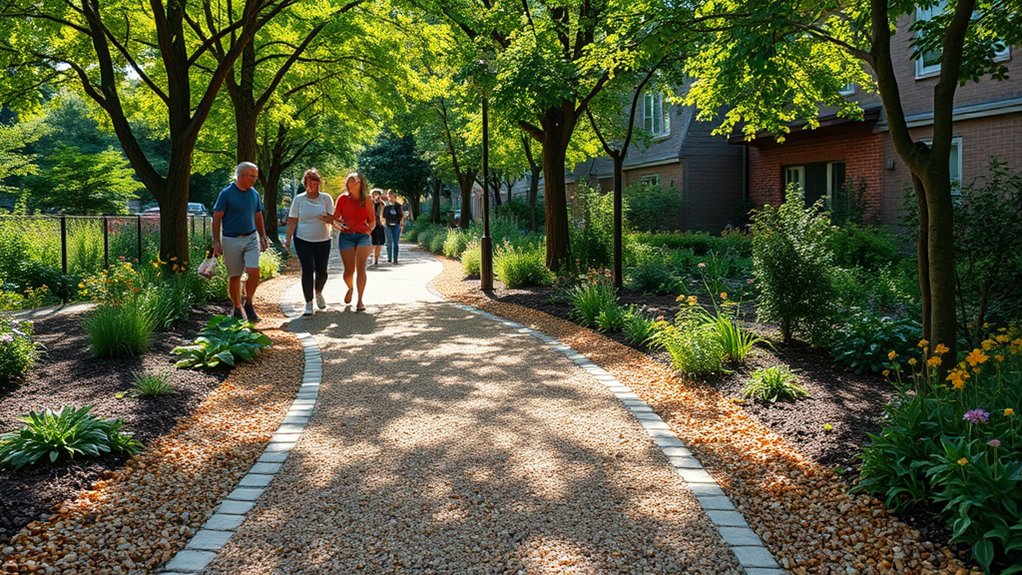
Resin-bound gravel enhances urban green spaces whilst supporting sustainable practices in UK communities. Its smooth, permeable surface makes parks and pathways more accessible, perfect for everyone from parents with pushchairs to elderly residents.
Local councils find these surfaces particularly effective in high-traffic areas like town squares and community gardens, where they reduce puddles and maintenance costs.
The material’s natural drainage helps maintain healthy plants and trees, supporting local wildlife and creating pleasant green spaces. Whether used in heritage areas or modern developments, the variety of colours and finishes available means it can complement any setting – from Victorian park walkways to contemporary housing estates.
The durability of resin-bound surfaces means less frequent repairs and better value for money compared to traditional materials. Communities benefit from safer, more attractive spaces that encourage outdoor activities and social interaction, whilst councils appreciate the reduced upkeep requirements.
Frequently Asked Questions
How Does Resin-Bound Gravel Compare to Traditional Paving Materials?
Resin-bound gravel offers distinct advantages over standard paving options. The installation takes less time than traditional block paving or concrete, whilst its long-lasting nature means fewer repairs and lower maintenance costs. Think of it like a robust garden path that won’t need constant weeding or replacing loose stones – practical for British weather and everyday use.
Can Resin-Bound Surfaces Be Installed Over Existing Pavement?
Most existing surfaces can accommodate resin-bound paving, provided they’re structurally sound. A solid concrete or tarmac base works well, much like building upon a firm foundation. Just ensure the surface is clean, stable and properly prepared before installation begins.
What Colors and Finishes Are Available for Resin-Bound Gravel?
Resin-bound gravel comes in a vast selection of colours, from crisp whites and classic greys to warm browns and natural stone shades. The finish can be smooth and glossy or matt and textured, giving you control over both the look and grip of your surface. Popular choices include Yorkshire Buff for driveways and Silver Granite for contemporary garden paths.
Is Resin-Bound Gravel Suitable for Driveways and Heavy Traffic Areas?
Resin-bound gravel works brilliantly for residential driveways, but think twice before using it in high-traffic spots like car parks or loading bays. Whilst it’s tough enough for daily family vehicle use, heavy lorries and constant traffic might be too much for it. The key to success? A properly prepared sub-base and realistic assessment of your traffic needs – just as you’d expect for your home’s foundations.
How Do I Maintain Resin-Bound Surfaces Over Time?
Regular sweeping and hosing down are essential for resin-bound surface maintenance. For tough stains, a gentle pressure wash or scrub with soapy water works well. Should cracks or damage appear, patch repairs can be done using matching resin, whilst larger areas might need professional resealing. Best to sort minor issues quickly to prevent bigger problems down the line.
Conclusion
Resin-bound gravel offers an environmentally conscious choice for your driveway or garden paths. This practical surface combines kerb appeal with genuine green credentials, from its natural drainage properties to its use of recycled materials. Whilst traditional paving often contributes to flooding issues, resin-bound surfaces allow rainwater to filter naturally into the ground. The material’s durability means less frequent replacement, reducing waste and resource consumption. For British homeowners looking to make sustainable choices, resin-bound gravel presents a smart, eco-friendly alternative to conventional paving options.
